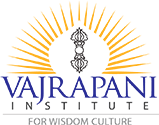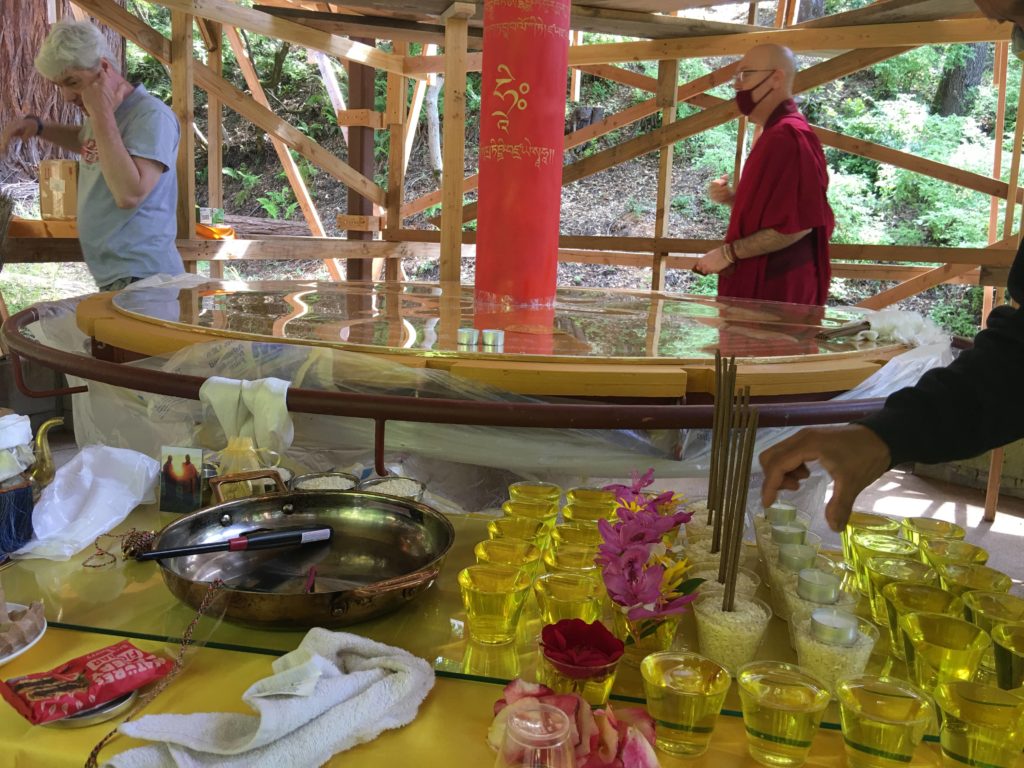In-Depth Meditation Training: The Radiant Ground – Emptiness and Buddha Nature
Venerable Losang Gendun
September 6 - November 29, 2025
We’re delighted to announce that Vajrapani Institute is now offering the FPMT program, In-Depth Meditation Training, led by Venerable Losang Gendun. This four year course is designed so that students can join at any time and immediately benefit. Each class includes 60 minutes of guided meditation followed by 90 minutes of lecture, including Q&A. Over 100 students from around the globe come together each week for this transformative program!
Year 3, Term 1
The Radiant Ground: Emptiness and Buddha Nature
Saturdays: September 6th to November 29th
6:30 AM- 9:00 AM (PST) Online via Zoom
NOTE: Saturday November 1st will be 7:30 AM- 10:00 AM due to daylight savings change
About IDMT
Although grounded in the theory and practice of the Tibetan Buddhist tradition, with a drop of Theravada, the training will prioritize the needs and levels of practice of participants.
To get the most from this course, we recommend attending all live sessions when possible, or viewing the class recordings on The Buddha Project website (a login is required). Upon registration, you’ll immediately receive a welcome email with the course Zoom link from Vajrapani. The Buddha Project will send registered students of the course website login details so that you can access the recordings and other course materials on The Buddha Project’s website. (Please be patient, getting the login can take up to a week)
Extensive content: you will receive weekly guided meditations combined with in-depth lectures that will cover a wide range of topics over four years:
- Foundational Vipassana (insight meditation)
- Yogacara (Mind-Only School)
- Madhyamaka (Middle Way – Consequence School)
- Tathagatagarbha (exploring our buddha nature)
- Mahamudra (investigating the ultimate nature of the mind)
- Kriya Tantra (transforming everyday experiences into opportunities for spiritual growth and realization).
To put these ancient techniques in a contemporary context, the course will give special attention to the psychology of meditation, through topics such as spiritual bypassing (using spirituality to hide from our problems), identity, narrative (the role of stories in our mental makeup and practice), language philosophy and ritual.
The course offers a combination of:
- Practical focus: emphasizing direct, personal experience through meditation while involving all three traditional practices of hearing, contemplating and meditating. It aims to help you navigate your meditative journey successfully, both on and off your cushion. It will help you make progress amid your daily, often hectic life. Diverse topics necessary for your level of practice, and that of your fellow practitioners, are illustrated and explored in guided meditations.
- Training concentration and insight: you will train in both shamatha (concentration) and vipassana (insight). Together we will gradually explore and investigate both the nature of self and phenomena as being impermanent and selfless, empty of imaginary nature and of inherent existence, our buddha nature, and the union of bliss and emptiness respectively.
- Open heart and mind: while various forms of insight meditation will take center stage, the goal is to provide contemplations that will open your heart, through such topics as compassion, the precious human life, definite emergence, bodhicitta and devotion. These are often, but not exclusively, taken from the sutras and Lamrim texts on the gradual path to enlightenment.
- Engagement: to avoid that your practice becomes disconnected from the real-world issues you experience, attention will be given to how the Dharma can inform us on how to engage with our everyday challenges, avoiding dogmatism, political bias, or polarization, and be of benefit to the world that we are all a part of.
- Supporting materials: you will be provided with a reader that focuses on instructions from the Buddha and other foundational texts. This will be complemented with numerous essays and practical advice on a range of topics such as the arhat and bodhisattva ideals, the role of ritual, identity formation, metaphor in Yogacara, Buddhist epistemology, theory of narrative and so on.
How to participate:
- The course consists of weekly online sessions of a 60-minute guided meditation, a 90-minute lecture with ample opportunity for Q&A. Sign up for a whole semester (recommended) or drop in on a class by registering below.
- After registration, you will receive access to the Online Learning Center on The Buddha Project website. Here you will find access to the Zoom sessions, the supporting materials, and recordings of past guided meditations and lectures.
- Depending on the interest of participants, these classes may be embedded in practice days, guided by experienced students, which will provide a supportive environment for joint practice and discussion.
Who might want to participate:
- This course is beneficial for practitioners who want to further develop their meditative practice, by receiving in-depth meditation instructions and by getting a deeper understanding of the (philosophical and psychological) foundations of meditation. It will provide a complement for those who study Buddhism, to investigate and verify experientially the various subjects taught by the Buddha.
- To participate, you will need a basic understanding of Mahayana Buddhism, although the course will introduce many of the foundational topics. A basic understanding can mean having completed FPMT’s Discovering Buddhism course or the FPMT Basic Program or having obtained a similar level through other means.
Year 3 Term 1: Sep 6 to Nov 29, 2025:
The Radiant Ground: Emptiness and Buddha Nature
This year’s journey will weave together the profound view of Madhyamaka, as presented by Nāgārjuna and his successors, with the compassionate vision of Tathāgatagarbha, the Buddha-nature teachings that reveal our deepest potential for awakening. Far from abstract philosophy, these teachings offer a radical reorientation of how we perceive ourselves and the world — pointing us beyond habitual grasping to a space of clarity, openness, and profound compassion. Having cultivated the foundational practices of shamatha and vipashyana in the first year and explored Yogācāra’s profound psychology of ignorance and awakening in the second, we now turn to the very heart of Tibetan Buddhism: the nature of emptiness and the luminous potential that resides within every living being. Guiding us in this exploration will be core texts from India and Tibet. Nāgārjuna’s Mūlamadhyamakakārikā will serve as a central pillar, systematically dismantling the illusions of inherent existence.
In dialogue with this, we’ll study Kamalashīla’s Stages of Meditation, a practical and accessible map for cultivating deep meditative insight grounded in the view of emptiness. Balancing the radical freedom of Madhyamaka, we will encounter the warmth and encouragement of Maitreya’s Ratnagotravibhāga, a poetic illumination of the Buddha-nature within all beings. These teachings remind us that beyond confusion and conditioning, there is a basic goodness that has never been lost. To ground these profound insights in daily life, we will also study the beloved text of Geshe Chekawa Yeshe Dorje, The Seven Points of Mind Training. With its pithy slogans and deeply practical tone, it offers tools for transforming adversity and cultivating bodhicitta on and off the cushion.
Throughout the year, our study and practice will be enriched by meditative teachings from both the Pāli and Sanskrit sūtra traditions, inviting a direct and experiential understanding of emptiness — not as a concept, but as a liberating shift in perception. This year is an invitation to let the view of emptiness infuse your practice — not as abstract philosophy, but as living experience: clear, liberating, and rooted in compassion. Our aim is not to gather concepts, but to transform how we see and relate to the world. Through study, reflection, and meditation, we learn to meet life with less grasping, more openness — and a heart that naturally responds with wisdom and care, held by the strength of community.
If you have any questions about registration, please email office@vajrapani.org. You will receive login information for The Buddha Project within 3 days to one week of your registration date.
Financial Aid/ Scholarships
We want to make retreats and dharma courses available to everyone. With this in mind, we will gladly work out a payment plan with you if needed. If more assistance is necessary, we offer several scholarships.
- For detailed information on setting up a payment plan, please see Financial Aid: Payment Plans
- To see if you’re eligible for a scholarship, and how to apply for scholarships, please see Financial Aid: Scholarships
Our utmost goal is to help as many beings as possible to have the gift of the dharma and retreat. If you have additional questions after reviewing the guidelines for payment plans and/or scholarships, please email the Office at office@vajrapani.org.
About Vajrapani Institute
Vajrapani Institute for Wisdom Culture was one of the first Tibetan Buddhist Retreat Centers in America. Vajrapani aims to provide a friendly and conducive environment for people of all nationalities to learn, put into practice the teachings of the Buddha, and connect with other Dharma practitioners. Located on 70 acres of secluded land within the redwood forests of the Santa Cruz mountains, Vajrapani Institute has been an immersive space for people of all backgrounds to find and deepen their spiritual practices, with the main goal of bridging the gap between the head and heart of practice.
Teacher
Venerable Losang Gendun has dedicated nearly four decades to practicing Buddhism and has served as a Bhikshu in the Tibetan tradition for the past 19 years. Prior to his ordination, he worked in diverse fields such as palliative care, technology, refugee organizations, and management. His extensive training includes ten years of studying Buddhist philosophy and practice in monasteries across France, India, Nepal, and Myanmar. Additionally, he spent over four years in retreat, immersing himself in Tibetan sutra and tantra, as well as the Burmese Theravada Forest Tradition. For the last 15 years, Ven. Gendun has taught worldwide, sharing his knowledge…
Learn more about Venerable Losang Gendun







